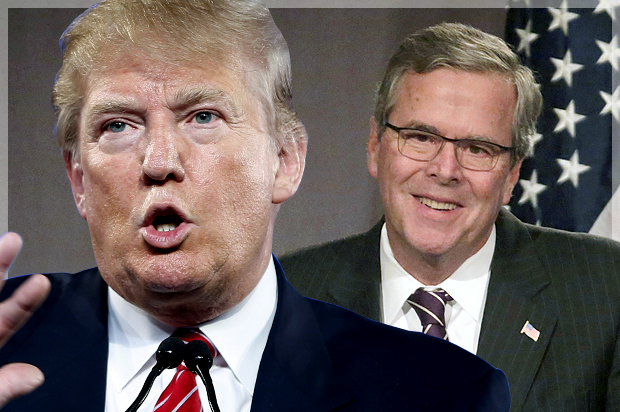It’s common to joke that Democrats must be behind Donald Trump’s presidential candidacy, so bad is it for the Republican Party. But another suspect might be Jeb Bush, since he benefits the most from Trump’s campaign. At least right now.
It’s true Bush slipped to third, a point behind Scott Walker, in the Washington Post/ABC News poll released Monday. But every other candidate is stuck in single digits. Trump is soaking up the oxygen the other candidates need, while Bush soaks up all the cash. The former frontrunner gets to look like the reasonable guy temperamentally, while having to change absolutely zero of his right wing positions.
Bush made two big moves this week that got him lots of positive attention, but ought to get him an award for hypocrisy. Though he took two weeks to blast Trump for his ugly remarks about Mexican immigrants, Bush smacked him down immediately after he insulted Sen. John McCain as “not a war hero.”
That’s funny: In 2005 Bush wrote a letter thanking Swift Vote Veterans for Truth founder Bud Day and the “other Swifties” for their “support of my brother in his re-election.” He went on: “I simply cannot express in words how much I value their willingness to stand up against John Kerry.” That “willingness” included lying about Kerry’s war heroism and insisting he would “go down in history as the Benedict Arnold of 1971” for his activism in Vietnam Veterans Against the War when he returned after his service.
Bush should be ashamed, but there’s no one in the race to shame him. Republicans only care about insults to war heroes when they’re fellow Republicans, apparently.
Then there’s Bush’s attempt this week to cast himself as running against Washington, even though his father and brother served as presidents and his grandfather Prescott was a senator. For the record, I support Bush’s call to increase the amount of time before members of Congress can return to lobby their former colleagues. But the notion that he is going to be the one to break the stranglehold of money on politics is ridiculous.
He and the PACs behind him have already raised a staggering $114 million. Hillary Clinton, rightly, got a lot of attention for raising $45 million, but she can’t compete with Bush on that front. Behind Bush are Texas Sen. Ted Cruz at $52 million and Florida Sen. Marco Rubio with $45 million.
In fourth place we find Scott Walker, who isn’t having as easy a time raising money as expected, despite his ties to the Koch Brothers and conservative stalwart Joe Ricketts. Groups supporting Walker have raised $26 million so far. But he’s been locked out of crucial Texas donor circles by the prowess of Bush and Rubio, and the local ties of Cruz and former Gov. Rick Perry. And his early campaign stumbles didn’t reassure potential donors he was presidential material.
Then there’s Trump. I think there’s reason to be cautious about making too much of his sudden surge in the polls. As Republican establishment folks are reminding us, he led the field briefly in 2011 before he decided not to run. In the 2012 cycle, luminaries like Herman Cain, Michele Bachmann and Newt Gingrich all took a turn in first place, and then faded.
But reassurances based on 2012 aren’t entirely apt. For one thing, the strength of weak candidates that year supposedly reflected the overall feebleness of the field, which included a pizza magnate, a Tea Party crackpot, a former senator and House speaker, three former governors, and an impaired Rick Perry. The 2016 field features what everyone said the GOP needed – four sitting governors plus three senators, along with some of the 2012 also-rans, plus a black neurosurgeon, a female ex-CEO and the carnival barker who’s currently leading the pack. Even with that alleged “deep bench,” the GOP is in trouble, again.
Still, Trump is likely at or reaching his peak. He’s become the candidate of the GOP’s far right, nativist base, and that probably limits his reach. The ABC/Washington Post poll also showed that his numbers sagged on the one day of polling they did after his McCain comments. They may take a toll.
But he’ll continue to appeal to GOP voters for whom McCain is the enemy: a RINO who backed two attempts at comprehensive immigration reform and lost to the usurper Barack Obama in 2008. The hectoring of pro-McCain Republicans and the media won’t be enough to defeat Trump. Expect him to stay in the race at least through the debates, overshadowing most of his rivals, while Jeb Bush counts his money and waits everyone out.
Of course, if Trump gets angry and runs a third party campaign, Bush’s strategy will unravel. That’s why he’s not expected to attack Trump beyond the obligatory shot over the McCain remarks. A third party run by Trump would be a disaster for Republicans, turning a reasonably competitive race between Clinton and Bush (in which she’s ahead by 6 points) into a rout in which she wins by 16. He’ll continue to vex the party, but for now, he’s helping Bush.

